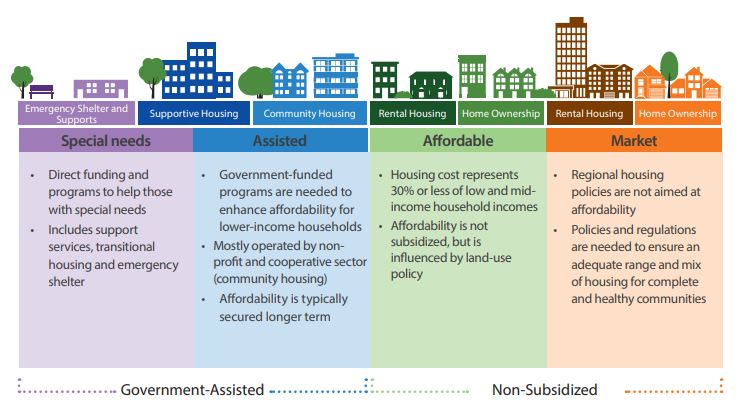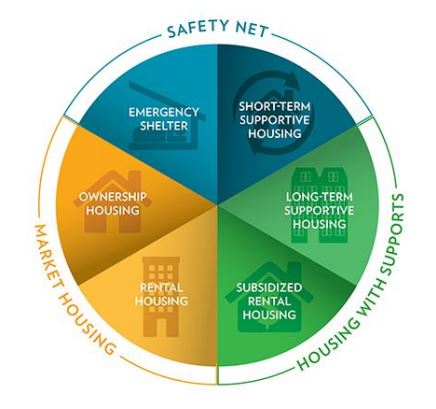The Burlington Housing Strategy’s virtual launch is now in the final stages of its feedback period, and residents who have kept up with the ongoing debate over the issues surrounding affordable housing development should take note.
The Burlington Housing Strategy Working Group (BHSWG) aims “to give current and future residents more housing opportunities across the city” by developing “creative and innovative solutions” through discussion of the next steps in formulating the city’s response to the growing housing shortage, and what policies and incentives can be enacted to combat the disparity between income and rent. The intention is to build on and support Halton Region’s strategy.
A large part of fostering those opportunities has been opening dialogue with residents by conducting surveys about attitudes and experiences with housing development and providing platforms for different interest groups to voice their hopes and concerns regarding the local impact of the national housing crisis.
At an August 26 public seminar hosted online via Zoom, working group panelists, consisting of city planners and development consultants, hosted by Councillor Shawna Stolte, reviewed the assembled feedback from respondents and city staff.
First up in the discussion was a recap of the revamped Housing Strategy survey, which the group restructured to provide clarity of purpose to participants and simplify both questions and responses to make it a more accessible experience.
The bulk of the seminar focused on a review of the group’s third and fourth technical memos, two in a series of documents outlining the specifics of the issues before them. The first of these memos outlined the basics of the housing crisis, identifying the most affected demographic groups.
The second memo focused on establishing a goal to be reached in terms of stabilizing the housing supply as well as defining what makes that housing “affordable” — in this case, meaning “costing less than 30% of a household’s pre-tax income.”
The third memo focuses on identifying and categorizing what kinds of housing make up the landscape in Burlington. One of the key points was that over 50% of all housing within the city limits are classified as single detached homes.
While it is no secret that Burlington is a victim of suburban sprawl, it is still startling to hear that more than half of the city’s housing stock is built for single families, though it deftly underlines the panel’s next talking point: with so many single families unable to afford a detached residence, the lack of high-density developments must be addressed.

Add to that the difficulties posed by residential zoning restrictions, and the most logical solution becomes, as the panel found, recommending bylaw changes to allow for the construction of semi-detached townhomes and three-storey walkups. That way, even if high-rise construction remains undesirable to lobby groups, doubling up on ground-level capacity remains as a reasonable solution.
Another remedy discussed was advocacy for the construction of what was termed “Alternative Dwelling Units,” or ADUs, referring to tiny homes, modular houses, shipping container homes, laneway houses, and all the like.
Citing Toronto and other metropolitan areas’ success in creating housing units by loosening restrictions on micro-dwellings, panelist Steve Gauthier advocated strongly for similar measures to be taken in Burlington. “We need to be innovative and lead the province…and our zoning laws are really going to hold us back in that regard,” he said.
Rounding out the discussion, it was noted that a major problem area for the national housing supply has been the rise of short-term rental units — and Burlington is no exception to the trend. With 773 active listings in the city, city council and staff have already enacted direction to regulate both short- and long-term rental units. The panel agreed that advocating for municipal policies to cut down on “tourist rentals” is the proper course of action.
Capping off the presentation was a briefing on the findings outlined in the fourth technical memo: namely, the broader strategies recommended by the consultancy groups in attendance. Of note was the mention of inclusionary zoning, the concept of requiring developers to set aside a predetermined number of units in any new development as affordable housing.
As luxury condominium development remains a hot topic in the public discourse around affordability, such a policy could potentially garner major support from residents if introduced in future council meetings, a thought echoed by Councillor Stolte as she concluded the meeting and opened the floor to questions from attendees. For those wishing to have their voices be heard as the group moves forward with their efforts, the Housing Strategy Survey remains open until September 3 and the next working group meeting is set for October 4. A public preview of the group’s interim report is due out on November 4 in advance of its official presentation to council on November 9.



